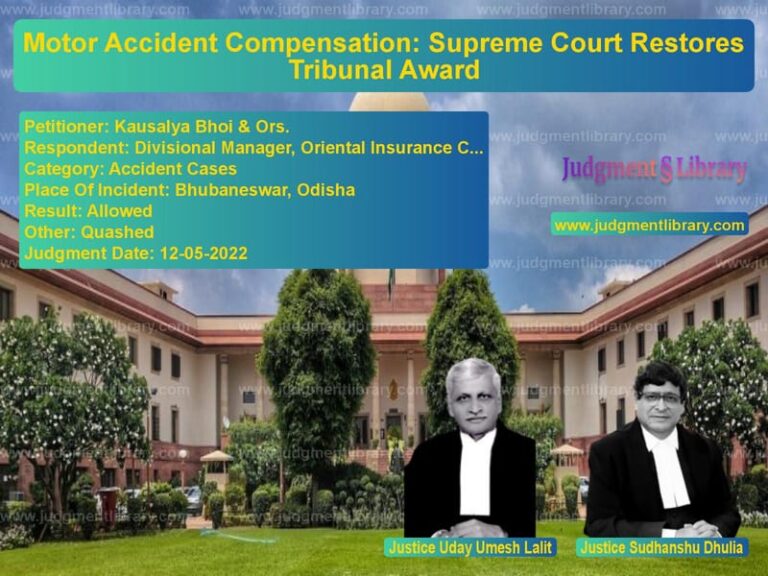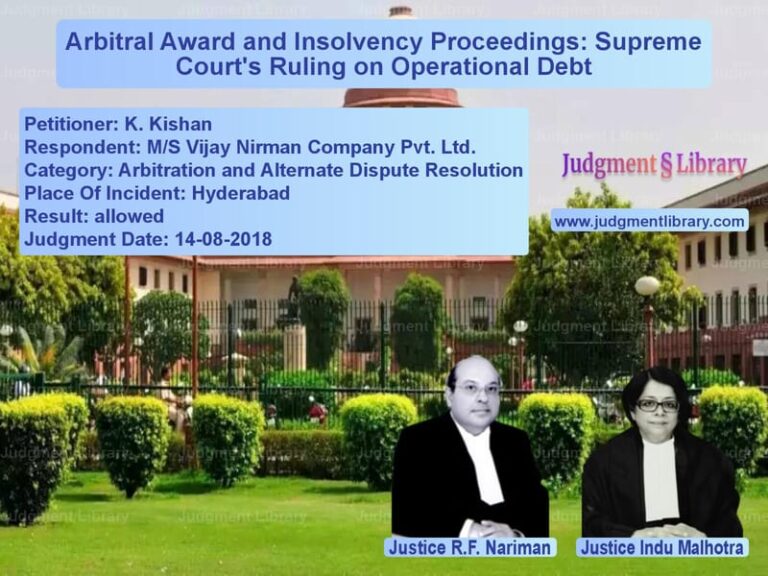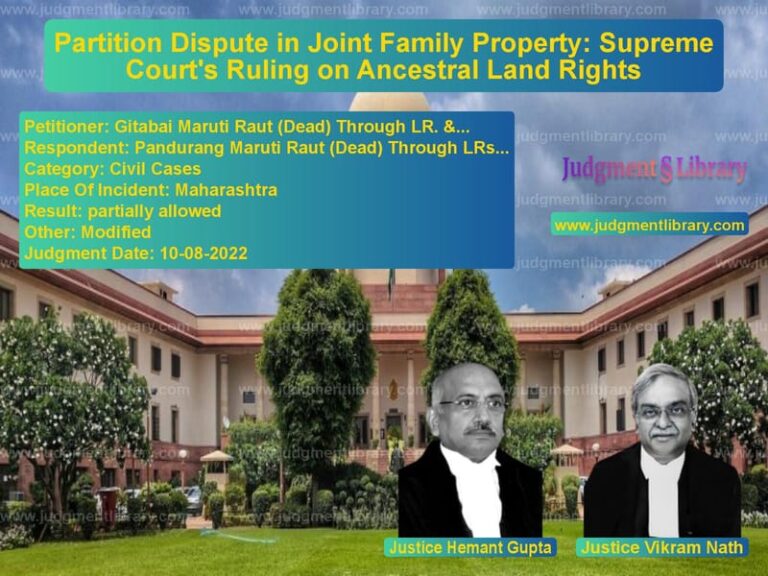Bail Denied to Saumya Chaurasia in Money Laundering Case: Supreme Court’s Critical Verdict
The Supreme Court of India recently delivered a significant judgment in the case of Saumya Chaurasia vs. Directorate of Enforcement. The appeal stemmed from the Chhattisgarh High Court’s rejection of Chaurasia’s bail plea in a money laundering case under the Prevention of Money Laundering Act (PMLA), 2002.
Chaurasia, a Deputy Secretary in the Chhattisgarh Chief Minister’s Office, was arrested on December 2, 2022, for her alleged involvement in a coal levy extortion racket. She was accused of aiding and abetting the primary accused, Suryakant Tiwari, in an elaborate money laundering scheme that involved the collection and transfer of illicit funds.
Background of the Case
The case originated from an income tax search and seizure operation conducted on June 30, 2022, against Suryakant Tiwari. Following the operation, the Income Tax Department filed an FIR against Tiwari under Sections 186, 204, 120-B, and 353 of the Indian Penal Code (IPC). Subsequently, the Enforcement Directorate (ED) registered an ECIR and launched an investigation into the suspected money laundering activities.
Read also: https://judgmentlibrary.com/supreme-court-ruling-on-food-safety-act-and-misbranding-charges/
Key Allegations Against Chaurasia
- Chaurasia, a bureaucrat, allegedly played a central role in facilitating the illicit financial activities of the accused syndicate.
- The ED’s prosecution complaint claimed that she was directly involved in the movement and laundering of illicit funds.
- The authorities alleged that a significant amount of money was used to acquire immovable properties in the name of her family members.
- It was asserted that Chaurasia had exercised undue influence in bureaucratic postings, allowing the extortion racket to operate efficiently.
Court’s Analysis and Judgment
The Supreme Court, in dismissing Chaurasia’s bail plea, noted several critical points:
- There was sufficient prima facie evidence that linked Chaurasia to the money laundering offense.
- Investigations revealed that she had directly benefitted from the extortion racket.
- The provisions of Section 45 of the PMLA, which impose stringent conditions for granting bail in money laundering cases, were applicable.
- The court found that the case against her was strong, and her continued custody was necessary for the ongoing investigation.
Key Arguments in Court
Petitioner’s Arguments:
- Chaurasia’s counsel contended that she had no direct involvement in money laundering.
- It was argued that the predicate offense (under the IPC) had been dropped, and therefore, the money laundering case could not stand.
- The petitioner cited the Supreme Court’s judgment in Vijay Madanlal Choudhary v. Union of India, arguing that PMLA proceedings should not continue in the absence of a predicate offense.
- It was also submitted that she was entitled to bail under the proviso to Section 45 of the PMLA, which allows for bail to women accused of offenses under the Act.
Respondent’s Arguments:
- The ED argued that Chaurasia had played a pivotal role in the money laundering scheme.
- They contended that even if the predicate offense was not included in the charge sheet, the PMLA case could still stand.
- The agency highlighted that the money trail led to properties owned by Chaurasia’s family, which indicated active involvement in the laundering process.
- The ED also stressed that releasing her on bail could compromise the investigation and allow her to influence witnesses.
Supreme Court’s Observations
The bench comprising Justices Aniruddha Bose and Bela M. Trivedi made several crucial observations:
- The appellant’s claim that the scheduled offense had been dropped was misleading.
- The evidence collected against her was substantial and indicated her direct involvement in the offense.
- The court ruled that the proviso to Section 45, which allows for bail to women, was not absolute and had to be applied judiciously.
- The court also imposed a fine of Rs. 1 lakh on Chaurasia for attempting to misrepresent facts before the Supreme Court.
Conclusion
The Supreme Court’s ruling in this case reiterates the rigorous standards applied in money laundering cases under the PMLA. The judgment underscores the principle that courts must ensure that accused persons do not exploit legal provisions to evade justice. By dismissing Chaurasia’s bail plea, the court has reinforced the need for stringent measures to combat financial crimes.
This case serves as a precedent for future money laundering cases, particularly those involving public officials and bureaucrats. It also highlights the importance of due diligence and transparency in legal pleadings before the highest court of the land.
Read also: https://judgmentlibrary.com/supreme-court-acquits-accused-in-murder-case-due-to-lack-of-evidence-2/
Petitioner Name: Saumya Chaurasia.Respondent Name: Directorate of Enforcement.Judgment By: Justice Aniruddha Bose, Justice Bela M. Trivedi.Place Of Incident: Chhattisgarh.Judgment Date: 13-12-2023.
Don’t miss out on the full details! Download the complete judgment in PDF format below and gain valuable insights instantly!
Download Judgment: saumya-chaurasia-vs-directorate-of-enfor-supreme-court-of-india-judgment-dated-13-12-2023.pdf
Directly Download Judgment: Directly download this Judgment
See all petitions in Money Laundering Cases
See all petitions in Bail and Anticipatory Bail
See all petitions in Fraud and Forgery
See all petitions in Extortion and Blackmail
See all petitions in Judgment by Aniruddha Bose
See all petitions in Judgment by Bela M. Trivedi
See all petitions in dismissed
See all petitions in supreme court of India judgments December 2023
See all petitions in 2023 judgments
See all posts in Criminal Cases Category
See all allowed petitions in Criminal Cases Category
See all Dismissed petitions in Criminal Cases Category
See all partially allowed petitions in Criminal Cases Category







